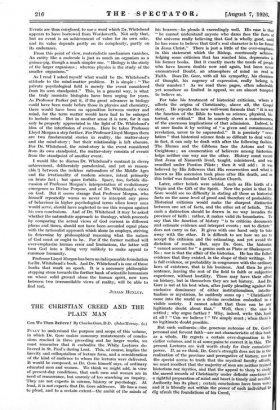THE CHRISTIAN CREED AND THE PLAIN MAN
Can We Then Believe? By Charles Gore, D.D. (John Murray. dz.) FULLY to understand the purpose and scope. of. this volume, in which Dr. Gore makes summary. restatements of conclu- sions reached in three preceding and far larger works, we. must remember that it embodies the . White Lectures de- livered in St. Paul's during Lent.. This, of course, implies the brevity and colloquialism of lecture form, and a consideration of the kind of audience to whom the lectures were delivered. It would be composed, as Dr. Gore himself says, of ordinary educated men and women. We think we might add, in view of present-day conditions, that such men and women are in need of reassurance, but scarcely of too searching an inquiry. They are not experts in science, history or psychology. At least, it is not experts that Dr. Gore addresses. He has a case to plead, and to a certain extent—the ambit of the minds of his hearers—he pleads it exceedingly well. His case is tho " he cannot Onderitand- anyone who- dares face the facts of the universe really believing that God is wholly, good, until he has come to believe that God's real character is to be &tin,' in Jesus Christ." There is just a little of the over-emphash
in this statement which the Bishop, courteously acknow.
ledging some criticism that has reached him, deprecates in his former books. But it exactly meets the needs of people
who have known doubts now and again, but have never
encountered Doubt, an atmosphere of mind as real as Faith. Does Dr. Gore, with all his sympathy, his clearness of thought, his cogency of expression, really belong to their number ? As we read these pages, often admirable yet somehow so limited in appeal, we are almost tempted to believe so.
For take his treatment of historical criticism, where it affects the origins of Christianity, above all,. the Gospel story. He repeats the now well-worn formula that " it is not
the function of the Bible to teach us science, physical, his. torical, or critical." But he scarcely shows a consciousness
of the enormous implications of that admission. Indeed, he at once limits it by writing of " a given and consummated revelation, never to be superseded." It is precisely " reve.
lation " that historical science finds so difficult to deal with:
in fact, it can only be dealt with after the following fashion. The Humes and the Gibbons face the Acton and the
Creightons ; an enumeration of believers among historians
helps neither one way nor the other. History must record that Jesus of Nazareth lived, taught, ministered, and was crucified under Pontius Pilate ; then it will add : it was believed by His followers that His resurrection and what is known as His ascension took place after His death, and on this belief was founded the Christian Church.
Later, other beliefs were added, such as His birth of a Virgin and the Gift of the Spirit. Now the point is that Dr.
Gore would see no difficulty in stating all these as historical facts on the same level of proof and therefore of probability. Historical criticism would make the sharpest distinction
between one set of facts, and the other set of beliefs. That such a distinction should be drawn in no way invades the province of faith : rather, it makes valid its boundaries. To
say that the function of history " is to criticize documents and estimate evidence and interpret events ; not to dictate " does not carry us far. It gives with one hand only to take
away with the other. It is difficult to see how we are to accept the criticism and the estimating, and yet avoid the dictation of results. But, says Dr. Gore, the historian
" cannot account for " a genius such as Plato or Shakespeare.
No ; nor is that the affair of the historian. He has the fullest evidence that they existed, in the shape of their writings. It is full evidence, or probability in congruence with the ordinary laws of existence, that is his business. And then he give4 sentence, leaving the rest of the field to faith or subjective
experience, without hostility. These may have their effect
on history, but in themselves they are not history. And Dr. Gore is not at his best when, after justly pleading against the exclusive dominance of either institutionalism, intellec-
tualism or mysticism, he suddenly sums up : "Christianity came into the world as a divine revelation embodied in a
visible society. I cannot admit that there can be any legitimate doubt about that." Well, then a the case is settled ; why argue further.? Why, indeed, write this,book at all ? " Can we believe ? " We simply must ; When -there is no legitimate doubt possible. _ .
But such outbursts—the generous _outcome of Dr. Gore's personal and fervent faith—are not characteristic of this book as a whole. He regrets a certain over-dogmatism in Ill, earlier volumes, and is at some_pains.to_correct it in this. Ill' present Lectures are Well worth study for their cumulative power. If, as we think, Dr. Gore's strength does not lie in the realization of the province and prerogative of history, nor in the special access to truth that the mystical faculty afford, we must recollect that the majority of men are neither trained historians nor mystics, and that the anpeal to-thein-tx, 'study, the sacred records of Christianity under definite sanctions 0- a rightful preparation of mind and heart is timely and needful. Authority has its place ; certain conclu-sions have been won ; and it is literally not within the power of each individual to dig afresh the foundations of his Creed, —






































 Previous page
Previous page